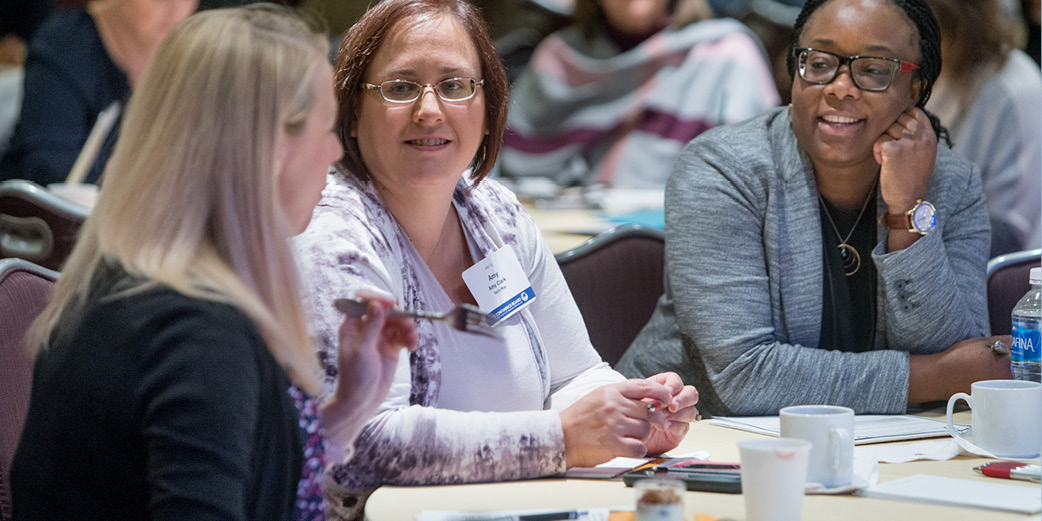Press Release
CEOs & Other Business Executives Discuss Addressing Health Inequality
2021-03-04
Conversations with…
—CEO of Robert Wood Johnson Foundation—
—CEO of Northwell Health—
and more…
Leading CEOs and business executives from across American industry spoke yesterday about how their organizations are tackling health inequality, offering actionable insights for other business leaders on how to drive change in their own communities.
Hosted by The Conference Board, each day of the Building a More Civil & Just Society Conference showcases how businesses are taking on one of America’s three major social inequities: economics (day one), health (day two), and race (day three). Highlights from yesterday’s conversations on health disparities include:
Interview: The Health Equity Imperative
Dr. Besser, the President and CEO of the Robert Wood Johnson Foundation, has been vocal about how communities of color, tribal communities, and poor communities face well-documented disparities in both access to health care as well as health outcomes. In this conversation, he discussed why he raised racism to the top of the list of social determinants and how businesses, nonprofits, and government leaders can work together to ensure everyone in America has a fair and just opportunity to thrive.
Key Quotes:
- “What we mean by equity is opportunity. That everyone in America should have a fair and just opportunity for health and well-being. That different people will require different things to achieve health. And that if you’re not looking at removing barriers—barriers that people face due to racism, and sexism, and classism, barriers due to where they may live—if you’re not addressing these barriers, you’re going to end up with major health disparities like we have in our country. The health disparities that have been made so clear this past year with the COVID pandemic.” — Dr. Richard Besser, President and CEO, Robert Wood Johnson Foundation (@ 8:05)
- “The business community using their power, using their voice, using their trusted position in society can go a long way in bridging this divide in a nation that’s more polarized that it’s ever been.” — Dr. Richard Besser, President and CEO, Robert Wood Johnson Foundation (@ 24:46)
- “If we become a society where the color of your skin, your gender, your beliefs, where you live, are not the factors that drive your success, the quality of your life, your well-being, how long you live, then we will truly have an America that is living up to its potential.” — Dr. Richard Besser, President and CEO, Robert Wood Johnson Foundation (@ 28:23)
Interview: Making Quality Healthcare Available for All
Michael Dowling, CEO of Northwell Health, discussed health and well-being inequality, the lessons we can learn to improve our healthcare system for underserved and at-risk populations, and how we can make quality healthcare accessible to all.
Key Quotes:
- “This is a wonderful opportunity right now for healthcare organizations to work in partnership with other businesses. Because health is more than the absence of illness. Health results from issues around housing, unemployment, food issues. So, I think there’s a great opportunity now for non-healthcare businesses and healthcare businesses to come together to focus on what we can do in many of these communities.”— Michael Dowling, CEO, Northwell Health (@ 4:07)
- “I would love to see happening—and I’m hoping to make it happen here—is to take a number of these communities, and you can do it in any region across the country, take some of these communities and say: We will focus on this area. We have business partners, we have government, and we have healthcare. Let’s listen to the local leaders in those communities, find out what is really of interest, what they want to have happen, and then work in concert to do some real, real demonstration sites overall. There needs to be more investment in behavioral health, mental health services, and more investment in community health centers.”— Michael Dowling, CEO, Northwell Health (@ 12:28)
- “Leadership to me is about making sure that people feel that they belong to the mission of the organization. That they just don’t work for an organization. People want to belong to something. You set in motion as a leader the culture of the organization. You try to build culture. That’s what good organizations are all about—culture. What’s the culture? It should be inclusive, provide opportunity for everybody to grow and advance. Put an extreme amount of effort into the safety and well-being of all employees, especially on the frontline. And a key part of leadership in my view is providing a talent pipeline for people in the organization to expand their horizons, expand their opportunities, to move up in the organization.”— Michael Dowling, CEO, Northwell Health (@ 15:28)
Conversation: Innovative Approaches: Holistic Well-Being in the Workplace
Workers today are being asked to deliver business results despite the challenges of a global pandemic, social unrest, and an economic crisis. Amid rising concerns for their mental and physical well-being in this sustained period of high stress, many companies are taking action to ensure that their workers are supported through personal and professional challenges. CHROs Ellyn Shook of Accenture and Ann Powell of Bristol Myers Squibb shared the innovative steps they are taking.
Key Quotes:
- “The obligation that an organization has to care for their people, care for their communities, in addition to their shareholders and also their consumers, is just growing in expectation. In fact, 86 percent of the workforce is looking to their leadership, their CEO to lead on societal issues. So the obligation has been dialed up.” — Ellyn Shook, Chief Leadership and Human Resources Officer, Accenture (@ 4:28)
- “I really, really hope that there’s a cultural shift that takes place that no longer glorifies the ‘overwork’ and the ‘always on’—working through the weekends and sending emails at midnight or one o’clock. I really hope that sustainable success and efficiency replaces that, because that’s just not a smart way to work. I think that successful companies will take all of this, they’ll embed wellness, focus into their culture, they’ll storytell around it, they’ll put actions in place, and it truly will be a differentiator for those companies and those workforces that get that established as part of their culture going forward.” — Ann M. Powell, Executive Vice President and Chief Human Resources Officer, Bristol Myers Squibb (@ 24:21)
- “What I think we need to see is more confidence and bringing these ideas forward to our leadership teams and our boards and connecting the importance of wellness to business results. While many organizations are doing the right thing now, long after the pandemic is over all people will have many, many choices for jobs. Companies that really understand that you can lead with values and create value to a more significant extent will win in the talent market. Creating sustainable change in your workforce, in your workforce strategies, including your well-being strategies, I think are going to put more distance between the leaders and the laggards.” — Ellyn Shook, Chief Leadership and Human Resources Officer, Accenture (@ 26:01)
- “Ask and listen to your workforce regarding what they need, but also what they value. And for the actions that you do put in place, connect it back to their feedback and thank them. This builds the trust and the reinforcement that you care. And that’s so foundational to this work.”— Ann M. Powell, Executive Vice President and Chief Human Resources Officer, Bristol Myers Squibb (@ 29:50)
In case you missed day one of the conference on Tuesday, here are more highlights on how corporate America is tackling economic inequality:
Panel: Laying the Foundation for Economic Success - Early Childhood Education
This conversation explored how early education helps develop the most critical skills for success and how companies can support efforts to provide quality education for all children.
Key Quotes:
- “We know that unlocking children’s early learning potential and strengthening these foundational connections is deeply dependent on engaged social interaction. In other words, experience shapes brain architecture, and caring, responsive adults, like those found in high-quality early education settings, played a critical role of chief architect.” — Laura A. Jana, M.D., Pediatrician, Health Communicator & Author, Penn State University/Jana Ventures (14:36)
- “Early educators make it possible for parents of young children to remain in the workforce. They provide the health and safety of an environment, the care, and the early education that helps children develop the skills they need, and will need, to thrive in a modern world.” — Jo Kirchner, Chief Executive Officer, Primrose Schools (16:19)
- “Business leadership matters whether you’re at the CEO level, mid-management level, from a volunteer standpoint, from an advocacy standpoint, from an awareness standpoint—it all matters. This goes back to the crux of connecting these synapses, producing these kids that can successfully enter the K-12 systems, succeed beyond that, and economically and socially have mobility to go through our society. It truly is the root of a civil and just society in my opinion.” — Steve Odland, President & Chief Executive Officer, The Conference Board (25:39)
Click here for more highlights from day one of the event.
To register for day three of the conference, email Katie.Puello@tcb.org.
If you intend to use video footage from the conference, please notify and credit The Conference Board.
Media Contact: Katie.Puello@tcb.org
About The Conference Board
The Conference Board is the member-driven think tank that delivers Trusted Insights for What’s Ahead®. Founded in 1916, we are a non-partisan, not-for-profit entity holding 501 (c) (3) tax-exempt status in the United States. www.conference-board.org
For further information contact:
Joseph DiBlasi
781.308.7935
JDiBlasi@tcb.org














